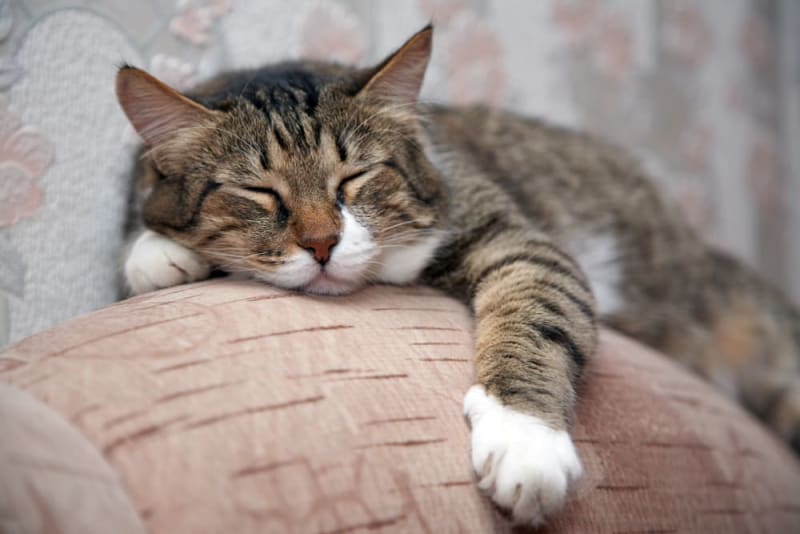As an Amazon Associate I earn from qualifying purchases.
Leaving a cat alone can be tricky. Cats are independent but need care.
How long can you leave a cat alone? The answer depends on many factors. Cats can handle some alone time. But too much can be harmful. They need food, water, and attention. You must consider their age, health, and personality.
Kittens need more supervision. Older cats may have health issues. Even an adult cat can get lonely. Understanding your cat’s needs helps in planning their alone time. This guide will explore the best practices for leaving your cat alone safely. Discover the balance between independence and care for your feline friend.

Credit: www.brookhavenanimalhosp.com
Factors Affecting Alone Time
Understanding how long you can leave a cat alone depends on many factors. These factors ensure your cat’s well-being and happiness. Let’s explore some key aspects that influence alone time for your feline friend.
Age And Health
Age plays a crucial role in determining alone time. Kittens need constant supervision and care. They require feeding, social interaction, and playtime regularly. Older cats may have health issues that need monitoring. Health conditions like diabetes or kidney disease need regular attention. Healthy adult cats can stay alone longer. Ensure they have food, water, and a clean litter box.
Temperament And Breed
Temperament varies significantly among cats. Some cats are independent and enjoy alone time. Others may suffer from separation anxiety. Breeds also play a role. Siamese cats are social and need more interaction. Persian cats are more laid-back and can handle being alone. Understanding your cat’s temperament and breed helps determine appropriate alone time.
Preparing Your Home
Cats can be left alone for up to 24 hours with proper preparation. Ensure they have enough food, water, and a clean litter box. Provide a safe and comfortable environment with toys to keep them entertained.
Leaving your cat alone requires some preparation. Your feline friend needs a safe and comfortable space. Proper planning ensures your cat’s well-being. Let’s discuss important steps.Food And Water
Ensure your cat has enough food. Use an automatic feeder if gone for long. It keeps food fresh and portions controlled. Fresh water is essential. Use a water fountain or multiple bowls. Change water daily to keep it clean.Litter Box Setup
A clean litter box is crucial. Use multiple boxes if away for days. Ensure easy access to these boxes. Scoop waste before leaving. Add extra litter to each box. This keeps them clean longer. Preparing your home well ensures your cat’s comfort and safety. “`Keeping Cats Entertained
Leaving a cat alone can be worrying. You want your cat to stay happy and entertained. Keeping your cat occupied will prevent stress and boredom. This section explores ways to keep your cat busy.
Toys And Puzzles
Cats love to play. Toys and puzzles can keep them entertained for hours. Here are some options:
- Feather wands – Great for interactive play.
- Laser pointers – Cats love to chase the light.
- Catnip toys – Stimulate their senses.
- Food puzzles – Combine mental and physical exercise.
Rotating these toys keeps things fresh and exciting.
Interactive Devices
Interactive devices can also engage your cat. Some devices work on timers and can be activated remotely. Here are some options:
- Automatic laser toys – Move the laser in random patterns.
- Interactive treat dispensers – Reward your cat with treats.
- Robotic mice – Mimic the movement of small prey.
- Cat TV – Shows with birds or fish that cats find fascinating.
These devices can help keep your cat entertained when you are not home.
| Device | Benefits |
|---|---|
| Automatic laser toys | Encourage physical activity and focus |
| Interactive treat dispensers | Stimulate their mind and reward with treats |
| Robotic mice | Provide prey-like movement to engage hunting instincts |
| Cat TV | Visual stimulation with nature scenes |

Credit: www.feliway.co.uk
Monitoring Your Cat
Monitoring your cat while you’re away is crucial for their well-being. Technology and community can help ensure your feline friend is safe and comfortable. Let’s explore some effective ways to keep an eye on your cat.
Pet Cameras
Pet cameras provide a live feed of your cat’s activities. These devices allow you to see your cat in real-time. Some models offer two-way audio. You can talk to your cat and hear their responses. This interaction can reduce your cat’s anxiety. It also gives you peace of mind. Ensure the camera covers key areas like the feeding spot and litter box.
Check-ins With Neighbors
Ask a trusted neighbor to check on your cat. They can ensure your cat has food and water. They can also interact with your cat. This human contact is important. It can help prevent loneliness and behavioral issues. Provide your neighbor with a key and instructions. Let them know your cat’s routine and preferences. Regular check-ins can make a big difference.
Addressing Separation Anxiety
Leaving your cat alone can cause separation anxiety. Understanding and addressing this anxiety is crucial. Cats, like humans, can feel lonely. This can lead to behavioral problems. Let’s dive into how you can identify and alleviate this anxiety.
Signs To Watch For
It’s important to recognize the signs of separation anxiety in cats. Here are some common indicators:
- Excessive meowing or crying when you leave.
- Destructive behavior like scratching furniture.
- Changes in appetite or litter box habits.
- Pacing or restlessness.
- Over-grooming or pulling out fur.
If you notice these signs, your cat might be experiencing separation anxiety.
Calming Techniques
There are several techniques to help calm your anxious cat. Consider the following:
- Interactive Toys: Provide engaging toys to keep your cat occupied.
- Comfort Items: Leave your cat with a piece of clothing that smells like you.
- Calming Music: Play soft music to create a soothing environment.
- Routine: Stick to a consistent feeding and playtime schedule.
- Pheromone Diffusers: Use diffusers to release calming scents in your home.
These techniques can help reduce anxiety and make your cat feel more secure.

Credit: www.purewow.com
Hiring A Pet Sitter
Leaving your cat alone can be stressful. Hiring a pet sitter can help. A pet sitter can provide the care and attention your cat needs. This ensures your cat remains happy and healthy while you are away.
Finding The Right Sitter
Finding the right sitter is crucial. Look for someone with experience and a love for cats. Ask for recommendations from friends, family, or your veterinarian. You can also use online platforms to find a trusted sitter.
Consider these points when choosing a pet sitter:
- Experience with cats
- Positive reviews and references
- Availability during your absence
- Comfortable handling emergencies
| Criteria | Importance |
|---|---|
| Experience with cats | High |
| Positive reviews | Medium |
| Availability | High |
| Emergency handling | High |
What To Communicate
Clear communication is key. Provide detailed instructions to the sitter. Include feeding schedules, litter box maintenance, and any special needs your cat may have.
Here is a list of important details to share:
- Feeding times and amounts
- Litter box cleaning routine
- Medication instructions (if any)
- Emergency contact information
- Favorite toys and activities
Also, leave your vet’s contact information and any relevant medical history. This ensures your cat receives prompt care if needed.
Traveling With Your Cat
Cats can handle being alone for up to 24-48 hours. Leaving them longer could lead to stress and health issues. Ensure your cat has enough food, water, and a clean litter box.
Traveling with your cat can be an adventure. It requires some planning. Cats are sensitive to changes. They can get stressed. Knowing how to travel with your cat is key. This ensures their comfort and safety.Short Trips
Short trips are usually easier. Cats can handle short journeys. Use a secure carrier. Make sure it is comfortable. Place a soft blanket inside. Familiar smells help them feel safe. Bring their favorite toys. This can distract them. Ensure your cat has access to water. Hydration is important. Take breaks if you can. Let your cat stretch a bit. Never leave your cat alone in the car. It can be dangerous.Long Vacations
Long vacations need more preparation. Start by consulting your vet. Make sure your cat is healthy. Vaccinations should be up to date. Get a sturdy carrier. Your cat will spend more time in it. Comfort is crucial. Pack enough food and water. Bring their regular food. Sudden diet changes can upset their stomach. Consider a portable litter box. It helps maintain their routine. Keep their favorite blanket and toys handy. Plan your stops. Find pet-friendly accommodations. Many hotels welcome cats. Research ahead of time. Ensure the place is safe for your cat. Traveling with your cat can be fun. With the right preparation, both you and your cat can enjoy the journey. “`Emergency Preparedness
Leaving your cat alone can be stressful. Emergencies can happen anytime. Being prepared is crucial. This section will guide you on emergency preparedness for your cat. It covers essential contacts and backup plans to ensure your cat’s safety.
Emergency Contacts
Always have a list of emergency contacts. Include your vet’s number. Also, add a trusted neighbor or friend. These contacts should know your cat’s needs. Share any medical conditions or allergies. This information can save your cat’s life in emergencies.
Backup Plans
Backup plans are vital. Consider a pet sitter or a cat boarding facility. Make arrangements in advance. Ensure the backup plan is reliable. A friend or family member can also be a good option. They should know your cat’s routine and care instructions. This helps maintain consistency for your cat.
Frequently Asked Questions
How Long Can A Cat Be Left Alone?
Cats can be left alone for up to 24-48 hours. Ensure they have enough food, water, and a clean litter box.
Is It Okay To Leave A Cat Alone?
Yes, it is okay to leave a cat alone for short periods. Provide them with entertainment and essential resources.
Do Cats Get Lonely When Left Alone?
Yes, cats can get lonely. They might show signs of stress or anxiety if left alone too long.
How To Keep A Cat Entertained Alone?
Provide toys, scratching posts, and interactive feeders. Leave the TV or radio on for background noise.
Conclusion
Leaving your cat alone takes careful planning. Each cat has unique needs. Ensure fresh water and food. Create a safe environment. Use interactive toys for mental stimulation. Cats can manage alone for a day or two. Longer absences need a pet sitter.
Always prioritize your cat’s well-being. Happy cats lead to happy homes. Consider your cat’s personality and health. Every cat deserves love and attention. Proper preparation ensures your cat stays safe and content.
As an Amazon Associate, I earn from qualifying purchases.


